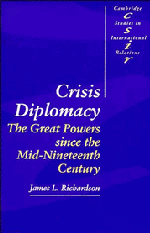Book contents
- Frontmatter
- Contents
- List of tables
- Acknowledgments
- I PART I
- PART II
- PART III
- 10 Crises and the international system: arenas, alignments and norms
- 11 The choice of goals: values, interests and objectives
- 12 Selective perception and misperception
- 13 Crisis bargaining
- 14 Internal politics
- 15 The outcome and the risk of war
- PART IV
- Notes
- Select bibliography
- Index
- CAMBRIDGE STUDIES IN INTERNATIONAL RELATIONS
12 - Selective perception and misperception
Published online by Cambridge University Press: 03 May 2011
- Frontmatter
- Contents
- List of tables
- Acknowledgments
- I PART I
- PART II
- PART III
- 10 Crises and the international system: arenas, alignments and norms
- 11 The choice of goals: values, interests and objectives
- 12 Selective perception and misperception
- 13 Crisis bargaining
- 14 Internal politics
- 15 The outcome and the risk of war
- PART IV
- Notes
- Select bibliography
- Index
- CAMBRIDGE STUDIES IN INTERNATIONAL RELATIONS
Summary
Perception and misperception have a prominent place in decision making studies, yet there are major differences over their significance – in particular over whether misperception is of real consequence in determining the course of events. The primary aim of this chapter is to assess the significance of misperception in crises in the light of the case studies, but as in those studies themselves it will first consider the less familiar topic of differing perceptions among decision makers. These, as we have seen, underlie many of the differences over national interests and objectives. The previous chapter noted certain patterns in the way in which these differences are resolved, but did not explore the reasons for these patterns. A study of the related perceptions may throw some light on the reasons. Furthermore, in several of the case studies it was seen to be difficult to distinguish between selective perception and outright misperception. It is appropriate to consider first the more general phenomenon, differences of perception, before that which is encountered much less frequently, misperception. Finally, the chapter will inquire which of the two principal modes of explanation of misperception, the cognitive and the motivational, is best supported by the findings.
The term ‘perception’ is used as the most convenient general term to refer to decision makers' views of the international situation which confronts them. It does not exclude analysis and assessment, but it also includes images, assumptions and the ‘instant perception’ of situations.
- Type
- Chapter
- Information
- Crisis DiplomacyThe Great Powers since the Mid-Nineteenth Century, pp. 255 - 280Publisher: Cambridge University PressPrint publication year: 1994



